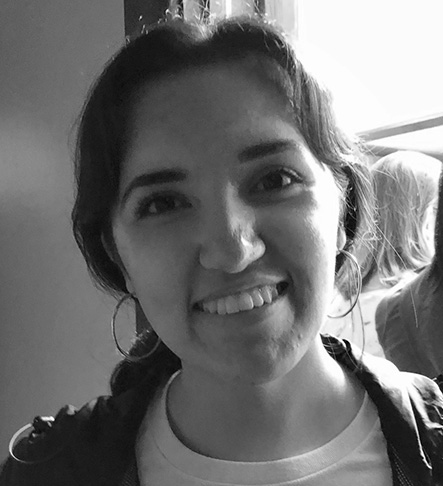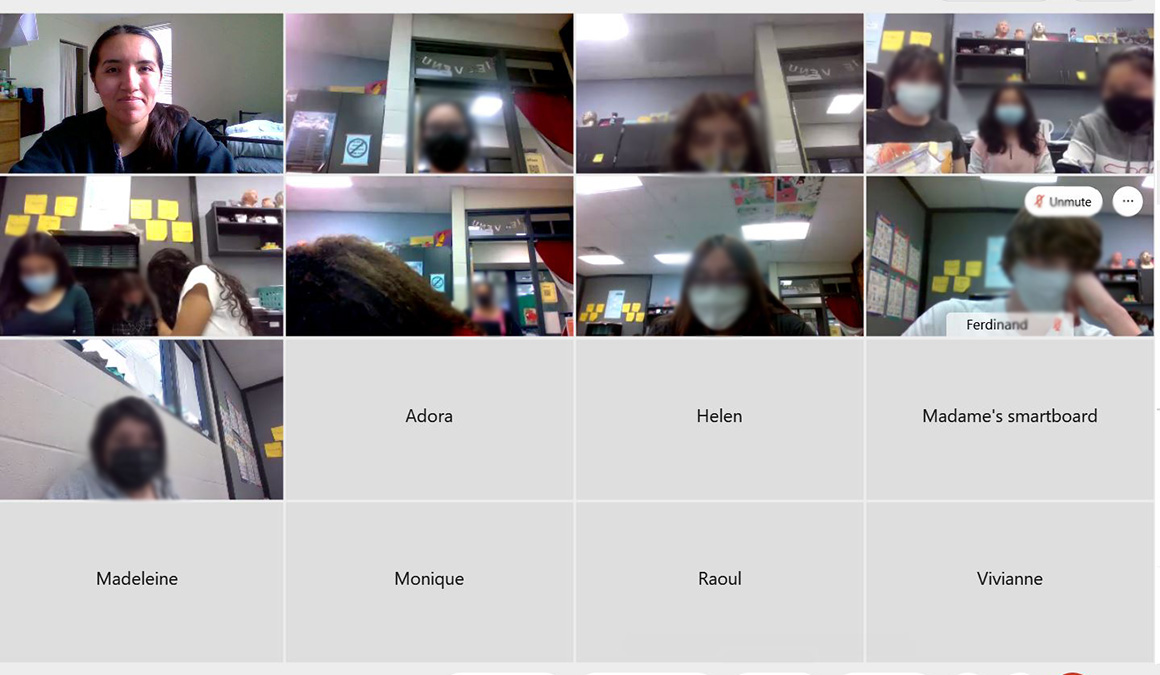Virtual Student Teaching
Grinnell education students remotely conduct field experiences in alumni classrooms.

With in-person teacher preparation experiences not possible, several alums virtually opened up their classrooms to aspiring educators.
Students at Rogers High School in Arkansas taking French classes this spring had two Grinnellians they could turn to for help with their assignments.
One was their teacher, Mary Parker ’06, who was physically with them in the classroom for in-person school. The other was Mercedes Varela ’21, who was watching and interacting via video on a laptop.
“Coming into it I wasn’t sure how it was going to play out because I was going to essentially be staring at the students while they were in class,” Varela says. “Mary provided me with so many good opportunities to get to know the students, and I eventually got to teach one of her French I classes. It was a very fruitful experience, and I was thankful she welcomed me into her classroom.”
Parker was one of several Grinnell College alums who hosted Grinnell students so they could attain field hours and gain experience before starting their own student teaching this fall. Teaching observations are typically done in-person, but the pandemic made that unrealistic.
 A screenshot from earlier this year shows Mercedes Varela ’21, top left, visiting with high school students who were taking a French class taught by Mary Parker ’06.
A screenshot from earlier this year shows Mercedes Varela ’21, top left, visiting with high school students who were taking a French class taught by Mary Parker ’06.
College students in Iowa usually have to accrue 80 field hours prior to student teaching. Iowa Gov. Kim Reynolds waived that requirement for this year, but Grinnell education faculty members thought it was worth trying to find ways for students to gain some of those hours.
“The hours are meaningful experience because it puts our students in the classroom,” says Cori Jakubiak, chair of the education department and an associate professor of education. “It wouldn’t have been fair to students to have to start student teaching without having this classroom experience.”
Teaching observations typically happen in Grinnell and surrounding areas so initially there weren’t many options to place students. In an effort to find alumni to remotely host Grinnell students, Leslie Bleichner '07, Lawrence S. Pidgeon Director of the Education Professions Career Community, coordinated communication and outreach to alumni and then paired teacher candidates with alumni volunteers. Jakubiak and her colleagues also reached out to recent alumni whom they taught. Overall, many alums were receptive despite dealing with their own challenges of teaching during a pandemic.
Charlotte Gbomina ’17, a Spanish teacher at North Kansas City High School, virtually hosted Paula Reyes ’21 in her classroom. Both Gbomina and Reyes are North Kansas City High School alums and Reyes’ younger sister was in Gbomina’s class last year. “Paula heard from her sister how I teach and then she was able to watch me do it,” Gbomina says.
In addition to observing, Reyes had a chance to teach three lessons. While Gbomina acknowledged the remote aspect made things more difficult, Reyes had opportunities to learn about lesson planning, changing up activities, and adaptability.
“Adapting is what we all had to do this year,” Gbomina says. “She was able to interact even though she wasn’t here in person. She got along really well with the students. When the observation was over, they kept asking about her. ‘Is Paula coming to class today?’ She definitely had an impact in my class virtually even though she couldn’t see them individually.”
During class, Gbomina projected Reyes on a TV screen in the front of the classroom so students could see her, and she could following along with the daily lesson. It was a similar setup in Arkansas in Parker’s classroom. Using Google Meet, Varela could see the students and hear pretty clearly what was going on. Students could approach the laptop to ask for help, make comments to her, or just say hi.
“Since this is the year where I am about to enter student teaching, Mary gave me the opportunity to get to know her students,” Varela says. “She would bring the laptop around to groups of students so they were motivated to talk with me. She made it an easier transition for me.”
A Las Vegas native, Varela is majoring in French. Her ideal future position is teaching French and Spanish. She will do her student teaching in the fall at nearby South Tama High School. Most Grinnell education students stay on at Grinnell for one more semester after they graduate in May. They complete their student teaching during a fall ninth semester.
Two Grinnell students were able to complete their student teaching this school year with in-person experiences. One taught in Grinnell and the other in Dubuque, Iowa, while living at home. Both had to agree to stringent public safety protocols.
“The student teachers got jobs right away, one as a full-time teacher and one as a substitute teacher, since there is such a need right now in the profession,” Jakubiak says. “It was important that we could contribute to solving the teacher shortage in the pandemic.”
Gbomina says several other educator alums from her 2017 cohort also hosted Grinnell students this school year. “It was nice to talk to them and share experiences,” she says. “Every teacher I talked with had some similar experiences during the pandemic whether they taught virtual, in person, or a hybrid.”
As a soon-to-be graduate of Grinnell, Varela says it was extremely encouraging to see alumni step up to help students.
“I really value the cooperation of the teachers who have helped me throughout my journey at Grinnell,” she says. “When it comes time, I too will be supportive in helping students at Grinnell who are preparing to be teachers.”
Learn more about Grinnell College’s Teacher Education Program.
— by Jeremy Shapiro
Through individually advised teaching and learning, Grinnell College has created a model for sustained discovery and meaningful contributions to knowledge and community. Kevin Rhodes ’85 and Melinda (Lindy) Lopes ’85 named a “dirty” teaching lab where anthropology students and faculty clean and process bones, artifacts and other specimens. Grinnell student researchers have helped Assistant Professor of Physics Charlotte Christensen understand how galaxies form and evolve.